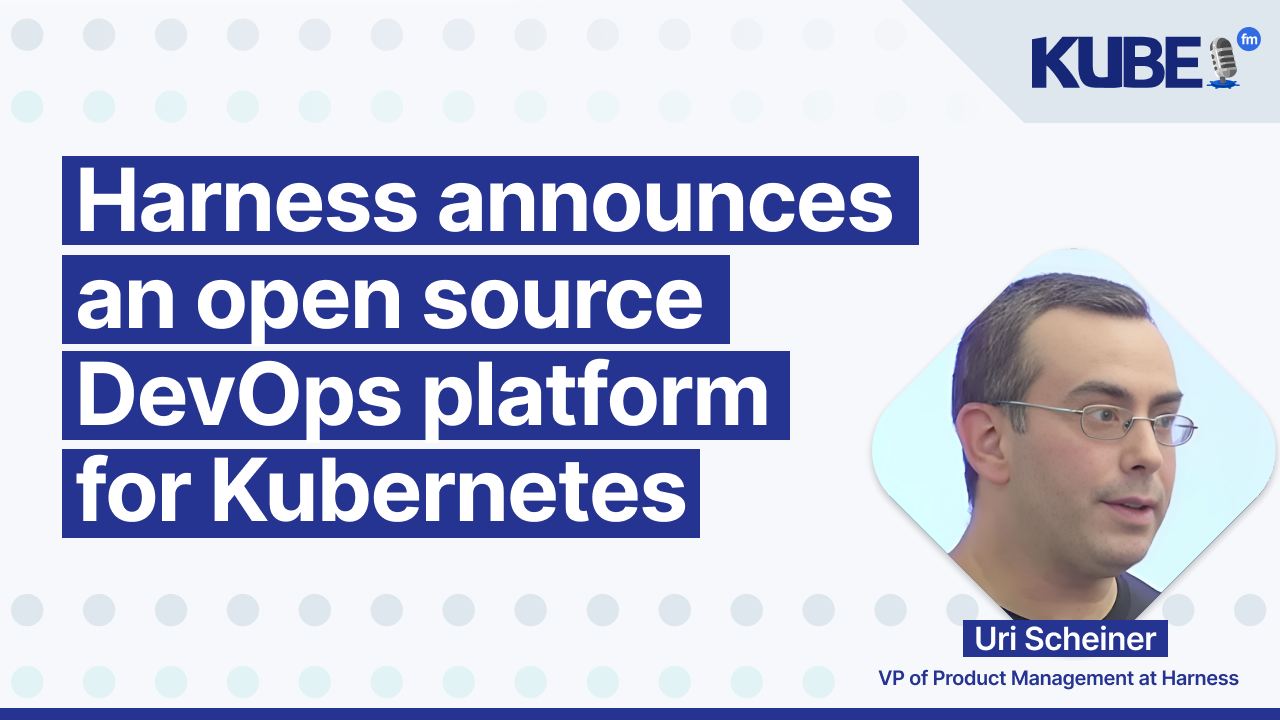Harness announces an open source DevOps platform for Kubernetes
Nov 18, 2024
Harness has unveiled their new Harness Open Source DevOps platform, a comprehensive solution that combines cloud development, Git, CI/CD, and artifact registry into a single, lightweight package.
This free, open-source platform solves a crucial challenge for Kubernetes practitioners by eliminating the complexity of stitching together multiple tools and managing cross-tool integrations.
Relevant links
Transcription
Bart: Easy question: who are you, what's your role, and who do you work for?
Uri: Hi, I am Uri, VP Product at Harness.io.
Bart: And what news do you want to share with us today?
Uri: So, before we talk about a very exciting announcement, let's discuss Harness.io. In case you don't know us, our mission is to improve developer experience and reduce toil from the development and delivery process. When we came out of stealth about seven years ago, our first product was a CD, continuous delivery, which simplified and modernized the delivery process for teams, especially focused on cloud-native applications, such as Kubernetes and serverless. Even before AI was prominent, we used machine learning to optimize the delivery process and determine if the result of the deployment was what you expected. We analyze data from multiple sources to understand the outcome of the release, to help you understand the outcome and decide what the next steps are. That was seven years ago. We've grown our portfolio significantly since then, and we have a very comprehensive DevOps platform. We started with CD, and we now have CI, Git repository, Feature Flags management, Litmus chaos engineering, and many other products, all on the same DevOps platform. It's a very comprehensive platform. We are also big sponsors of multiple open-source projects. We sponsor the Litmus project, which is a CNCF project in the Chaos Engineering project. We are big sponsors of OpenTofu. We had a great day yesterday here at KubeCon. We have Drone, which is a very popular open-source CI tool, and it's also part of our platform. We're big on open source. Last month, we had a very exciting announcement. We announced Harness Open Source, which is a complete DevOps platform that is open source and also very lightweight. It helps you, especially if you are a practitioner just getting started on Kubernetes, to install it on your laptop and get it up and running in 10-15 minutes.
Bart: With that in mind, could you share a little bit about the problems that Harness Open Source is solving?
Uri: Yes, so without this, if you want to have a DevOps platform that is open source and lightweight for your Kubernetes applications, you actually need to stitch multiple products together. You have to take care of the integration, making sure you pass tokens from one product to another. You don't have the same user experience across the different products, and you have to juggle between them to understand the progress of your code. It's not a great experience. With Harness Open Source, you have one product that does all of that together. Harness Open Source includes a cloud development environment, Git, CI, CD, and an artifact registry, all in the same product with a unified experience. This provides a much better experience for developers.
Bart: Can you tell me about Harness's business model?
Uri: We have a very comprehensive platform with 15 different products that are all on the same platform. If you use all these products together, they don't feel like separate products. They all have the same user experience and use the same services, such as pipeline, user management, access control, policy management, and dashboard. This unified approach makes them feel like one product with different functionality. However, if you don't want to use the entire platform, you can use just one or two products. For example, you can just use our CI and integrate it with third parties. Each product has a different license model based on the value it provides. But if you are using our platform as a whole, we have one holistic metric, which is users or developers.
Bart: And looking towards the future, what can we expect next from Harness.io, Harness Open Source, and the Harness.io platform?
Uri: We have several things in the works. I'd say there are two major areas of investment. The first one is AI, where we've made significant investments. In the last few months, we announced three AI assistants: the Harness DevOps Assistant, which helps dev teams manage and optimize their delivery pipelines; the Harness Code Assistant, which helps developers be more efficient; and the Harness QA Assistant, which helps manage, plan, and execute tests efficiently as part of the CI/CD pipeline. We're working on additional assistants. The second area is open source. As mentioned, we announced Harness Open Source, which includes the Cloud Development Environment, CI/CD, Git repository, and Artifact Registry. Our intent is to continue adding more solutions and functionality to this open source solution, so it will have everything practitioners need to get started with Kubernetes.
Bart: What's the best way for people to get in touch with you?
Uri: The best way is to just go to our website, Harness.io, and give it a try.

